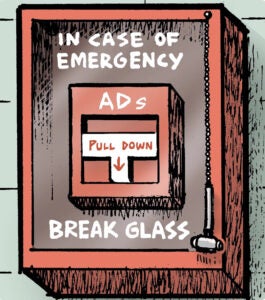No Fix For Brokers
Earlier this week, the Consumer Financial Protection Bureau (CFPB) abandoned plans to introduce a new rule limiting a data broker’s ability to sell the sensitive information of Americans, Wired reports.
The proposed rule would have allowed regulators to police financial data brokers under the Fair Credit Reporting Act (FCRA), one of the nation’s oldest privacy laws.
Third-party data brokers would have been barred from selling credit scores, Social Security numbers, phone numbers and addresses. Credit reporting agencies are already restricted from such activities under the FCRA.
The rule change was proposed in December under former CFPB chair Rohit Chopra. However, Chopra was replaced in February by Russell Vought, director of the Office of Management and Budget, who was appointed as acting CFPB director by President Trump.
The Financial Technology Association, a trade organization for fin tech companies, sent a letter to Vought on Monday claiming the proposed rule overstepped the CFPB’s authority and would be “harmful to financial institutions’ efforts to detect and prevent fraud.”
Vought squashed the rule change the following day, writing in a still-unpublished notice that the proposal did not align with the CFPB’s “current interpretation of the FCRA.”
AI’s True Lies
Social media is all in on AI-generated content, despite mounting evidence that deepfakes and AI slop are taking over these platforms and influencing users.
Even Academy Award winners aren’t protected from AI-fueled scams.
Actress Jamie Lee Curtis went viral this week for fighting back against an AI deepfake ad featuring her likeness that has been running on Instagram for months, the LA Times reports.
The ad repurposed footage from a recent interview with Curtis and manipulated her voice to make it seem as though she was endorsing a dental product. Curtis tells the LA Times that her management and legal teams first contacted Meta about removing the ad a month and a half ago – and received no response.
So Curtis took to Instagram on Monday and called out Meta CEO Mark Zuckerberg in a viral post. The fake ad was removed the same day, Meta confirmed to the LA Times.
But Curtis worries about the lack of official options for fighting back against AI deepfakes.
“I understand there’s going to be a misuse of this stuff, but then there’s no avenue of getting any satisfaction,” she tells the LA Times. “So then it’s lawlessness.”
Gas-ual Dining
Move over, CTV and digital ads, and make way for … gas pumps? Well, sort of.
Chain restaurant Applebee’s wasn’t seeing enough of a bump from CTV and online ads on their own, but when paired with GSTV – which stands for Gas Station TV – there was a 22% and 27% increase in visits, respectively.
GSTV has an 80% success rate at improving foot traffic for restaurant advertisers, Eric Sherman, GSTV’s EVP of insights and analytics told Adweek. Sherman describes these on-the-go ads as “Newtonian Advertising,” riffing on Newton’s first law of motion: People who are out and about are more likely to remain out.
GSTV is also reaching audiences who hadn’t seen Applebee’s ads elsewhere, expanding their reach and increasing brand awareness. These gas pump video ads alone increased foot traffic by 12%.
A parting thought: Gas might be bringing people to Applebee’s, but let’s just hope that, in return, Applebee’s isn’t giving people gas.
But Wait! There’s More
Former Google, X, Salesforce and MNTN execs raised $5.5 million for their startup Upscale AI, which uses AI to generate CTV ads for direct-to-consumer and ecommerce brands. [Adweek]
How does a publisher go from a data curation hater to a reluctant supporter? Ryan Maynard of Raptive confesses his change of heart. [AdMonsters]
X’s Grok AI is responding to queries with unrelated information about white genocide conspiracy theories in South Africa that have been promoted by X owner Elon Musk. [Gizmodo]
In other X news, the social platform has withdrawn its ad boycott lawsuit against Amazon’s Twitch, which was part of X’s larger lawsuit against the World Federation of Advertisers and GARM. [MediaPost]
You’re Hired!
Channel Factory appoints Kevin Gentzel as president, Americas. [release]
AI marketing platform Typeface adds Jason Ing as CMO and Jamie Garverick as CRO. [LinkedIn post]
Thanks for reading AdExchanger’s daily news round-up… Want it by email? Sign up here.















